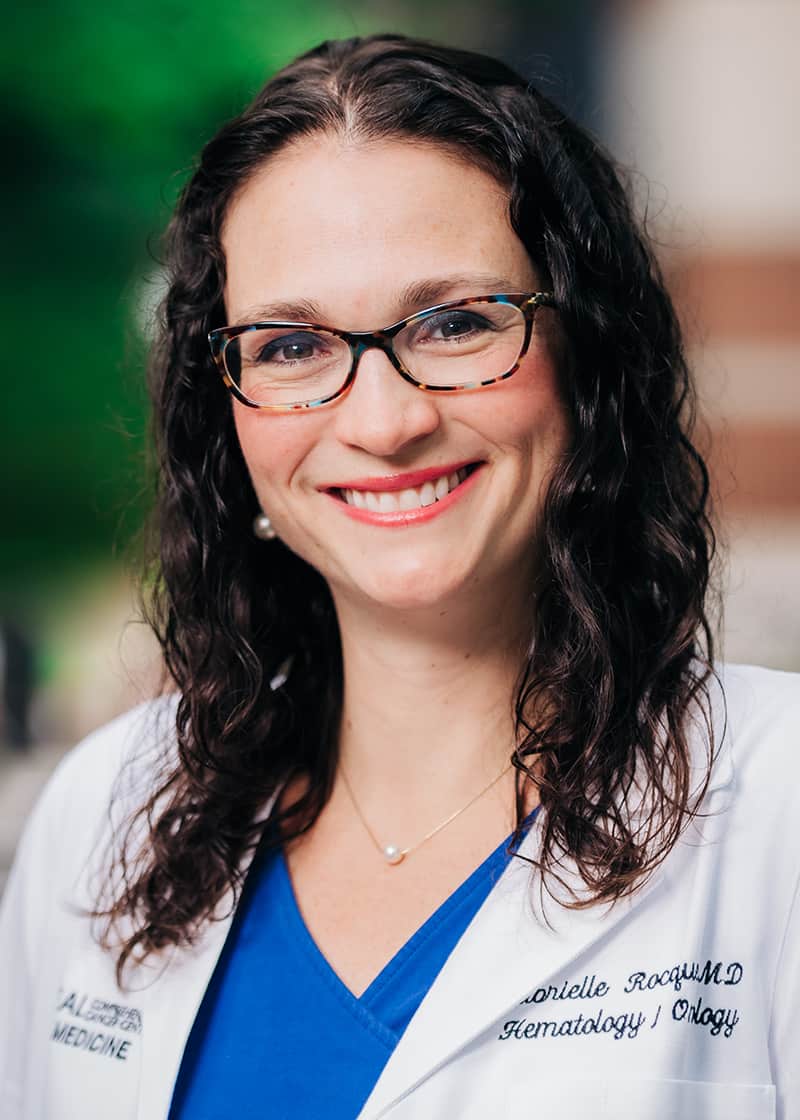The fight against breast cancer is about more than just treatment—it’s about empowering patients to live their best lives throughout their journey. The Heersink School of Medicine Office of Access & Engagement sat down with Gabrielle Rocque, M.D., a breast cancer specialist at UAB, to discuss how her work goes beyond traditional treatment to enhance resilience and quality of life for patients. Gabrielle Rocque, M.D.
Gabrielle Rocque, M.D.
Associate Professor, Division of Hematology and Oncology
Journey to oncology
Growing up in Wisconsin with an oncologist father and a nurse mother, Rocque’s early exposure to the medical field played a significant role in shaping her future.
“Initially, I didn’t think I was going to do oncology, but from day one, my dad told me, ‘you’re going to be a breast oncologist,’” said Rocque. “Over time, I realized I loved working with patients and enjoyed the direction I was going in.”
Rocque completed her medical school residency and fellowship at the University of Wisconsin, but shares what drew her to UAB 12 years ago.
“We first moved here for my husband’s fellowship, but ended up really falling in love with UAB and Birmingham. Particularly, the research space and the ability to do health care delivery work that supports patients and public health in a meaningful way.”
Developing patient-centered care initiatives
A major focus of Rocque’s work at UAB centers around enhancing patient experiences.
“I’m really motivated by my patients and thinking about ways we can best provide care for them,” she shares. “[I think to myself], how can we help them make decisions during what is a really difficult time in their lives and make sure that they have the best quality of life while they’re going through something really difficult?”
One of her most impactful initiatives is her study involving Carevive, a remote symptom monitoring platform that allows patients to report symptoms conveniently from home. Administered primarily to breast cancer patients, Carevive sends a quick, two-minute survey to their mobile devices, typically at regular intervals determined by their treatment schedules.
Once they receive the survey, patients are prompted to rate specific symptoms such as pain, nausea, and fatigue. When patients report a change in symptoms, a nurse is promptly notified, allowing for an immediate response to manage these changes before they escalate.
“We’ve seen some significant reductions in hospitalizations and ICU stays because we were able to more proactively manage our patients and make sure that we’re taking the best care of them.”
In addition to her remote symptom monitoring study, Rocque is conducting a clinical trial titled, “Promoting Resilience in Stress Management (PRISM)," which targets the psychological distress often faced by patients with breast cancer. Using an evidence-based program that includes skills-based coaching to build resilience, PRISM aims to enhance patients’ ability to cope with the emotional challenges of their diagnosis.
Over a six-to-eight-week period, participants will access the PRISM app and participate in coaching sessions focused on stress management, goal-setting, and cognitive reframing. By assessing patient feedback and monitoring outcomes, the trial aims to improve the emotional well-being and quality of life for those facing breast cancer.
A common challenge faced by cancer patients is a sense of isolation outside of clinical settings. By bridging the gap between clinic visits, Carevive compliments the PRISM trial by giving patients the reassurance that their symptoms are being monitored in real-time, ultimately making them feel more involved in their treatment and connected to their care team, even outside of scheduled appointments.
“I think the piece that I’m most passionate about is patient experience,” says Rocque. “I carry that front and center with everything I do.”
Raising awareness and support
Dr. Rocque’s work serves as a reminder that cancer care is not just about fighting the disease, but about helping patients thrive through the process. Her initiatives, which focus on improving both the emotional and physical well-being of breast cancer patients, are redefining what it means to receive comprehensive care.
As we continue to advance breast cancer treatment, it’s crucial to prioritize the patient experience—ensuring that those affected by the disease are supported in every aspect of their journey.